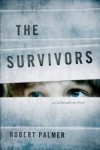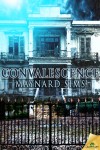

October 26 – November 1: “Do you find it more difficult to just read for pleasure?”
 This week we’re joined by ITW Members B. K. Stevens, Eric Beetner, Mick Sims and Len Maynard, Diane Kelly, Paul D. Marks, Cheryl Hollon, Peter James, Rob L. Palmer and Bernard Maestas to ask: As an author, do you find it more difficult to just read for pleasure?
This week we’re joined by ITW Members B. K. Stevens, Eric Beetner, Mick Sims and Len Maynard, Diane Kelly, Paul D. Marks, Cheryl Hollon, Peter James, Rob L. Palmer and Bernard Maestas to ask: As an author, do you find it more difficult to just read for pleasure?
~~~~~
 Cheryl Hollon writes full-time after an engineering career designing and installing military flight simulators in England, Wales, Australia, Singapore, Taiwan, and India. Living her dream, she combines a love of writing with a passion for creating glass art in the small glass studio behind her house in St. Petersburg, Florida.
Cheryl Hollon writes full-time after an engineering career designing and installing military flight simulators in England, Wales, Australia, Singapore, Taiwan, and India. Living her dream, she combines a love of writing with a passion for creating glass art in the small glass studio behind her house in St. Petersburg, Florida.
 Peter James was educated at Charterhouse, then at film school. He lived in North America for a number of years, working as a screenwriter and film producer before returning to England. His novels, including the Sunday Times number one bestselling Roy Grace series, have been translated into thirty-six languages, with worldwide sales of fifteen million copies. Three books have been filmed. He has also written a short story collection, A Twist of the Knife. All his novels reflect his deep interest in the world of the police, with whom he does in-depth research, as well as his fascination with science, medicine and the paranormal. He has also produced numerous films, including The Merchant of Venice, starring Al Pacino, Jeremy Irons and Joseph Fiennes. He divides his time between his homes in Notting Hill, London, and near Brighton in Sussex.
Peter James was educated at Charterhouse, then at film school. He lived in North America for a number of years, working as a screenwriter and film producer before returning to England. His novels, including the Sunday Times number one bestselling Roy Grace series, have been translated into thirty-six languages, with worldwide sales of fifteen million copies. Three books have been filmed. He has also written a short story collection, A Twist of the Knife. All his novels reflect his deep interest in the world of the police, with whom he does in-depth research, as well as his fascination with science, medicine and the paranormal. He has also produced numerous films, including The Merchant of Venice, starring Al Pacino, Jeremy Irons and Joseph Fiennes. He divides his time between his homes in Notting Hill, London, and near Brighton in Sussex.
![Pageflex Persona [document: PRS0000037_00019]](https://www.thebigthrill.org/wp-content/uploads/2015/10/paul-marks-e1444403700503.jpg) Paul D. Marks is the author of the Shamus Award-Winning noir mystery-thriller White Heat. Publishers Weekly calls White Heat a “taut crime yarn.” His story Howling at the Moon (EQMM 11/14) is short-listed for both the 2015 Anthony and Macavity Awards for Best Short Story. Midwest Review calls Paul’s noir novella Vortex “…a nonstop staccato action noir.” He also co-edited the anthology Coast to Coast: Murder from Sea to Shining Sea.
Paul D. Marks is the author of the Shamus Award-Winning noir mystery-thriller White Heat. Publishers Weekly calls White Heat a “taut crime yarn.” His story Howling at the Moon (EQMM 11/14) is short-listed for both the 2015 Anthony and Macavity Awards for Best Short Story. Midwest Review calls Paul’s noir novella Vortex “…a nonstop staccato action noir.” He also co-edited the anthology Coast to Coast: Murder from Sea to Shining Sea.
 Robert Palmer is a lawyer and law professor in Washington, D.C. His clients have included cops and school teachers, members of Congress, judges, and agency heads – and more than a few psychologists. In his spare time he enjoys distance running, downhill skiing, and backpacking in the Blue Ridge, the Rockies, and anywhere else with mountains. He lives with his wife and son and their Portuguese Water Dog, Theo.
Robert Palmer is a lawyer and law professor in Washington, D.C. His clients have included cops and school teachers, members of Congress, judges, and agency heads – and more than a few psychologists. In his spare time he enjoys distance running, downhill skiing, and backpacking in the Blue Ridge, the Rockies, and anywhere else with mountains. He lives with his wife and son and their Portuguese Water Dog, Theo.
 Maynard & Sims are the authors of fifteen novels with more scheduled, as well as numerous novellas and stories. They have won awards for screenplays, have been editors, essayists, publishers and reviewers. They are currently working on new novels, novellas, stories and screenplays.
Maynard & Sims are the authors of fifteen novels with more scheduled, as well as numerous novellas and stories. They have won awards for screenplays, have been editors, essayists, publishers and reviewers. They are currently working on new novels, novellas, stories and screenplays.
 Eric Beetner writes hardboiled crime fiction. A lot of it, with more to come. Many folks have said nice things about his books. He’s won a few awards like the 2012 Stalker award for Most Criminally Underrated author. He lives in Los Angeles where he co-hosts the Noir At The Bar reading series.
Eric Beetner writes hardboiled crime fiction. A lot of it, with more to come. Many folks have said nice things about his books. He’s won a few awards like the 2012 Stalker award for Most Criminally Underrated author. He lives in Los Angeles where he co-hosts the Noir At The Bar reading series.
 Bernard Maestas lives in paradise. A police officer patrolling the mean streets of Hawaii, he has a background in contract security and military and civilian law enforcement. When not saving the world, one speeding ticket at a time, and not distracted by video games and the internet, he finds time to write novels. His fast-paced, wise-cracking “Internet Tough Guys” series (which began with the brash “Say That to my Face” and “Godwin’s Law”) continues December 2nd with the explosive “You Think This is a Game?”
Bernard Maestas lives in paradise. A police officer patrolling the mean streets of Hawaii, he has a background in contract security and military and civilian law enforcement. When not saving the world, one speeding ticket at a time, and not distracted by video games and the internet, he finds time to write novels. His fast-paced, wise-cracking “Internet Tough Guys” series (which began with the brash “Say That to my Face” and “Godwin’s Law”) continues December 2nd with the explosive “You Think This is a Game?”
 B. K. (Bonnie) Stevens has published almost fifty short stories, most in Alfred Hitchcock’s Mystery Magazine. Some stories have been nominated for awards such as the Agatha and the Macavity; another won a Derringer; and another won a suspense-writing contest judged by Mary Higgins Clark. Her first novel, Interpretation of Murder, published by Black Opal Books in April, 2015, is a traditional whodunit that offers readers glimpses into deaf culture and sign-language interpreting. Her second novel, Fighting Chance, a martial arts mystery for young adults, will be published in October, 2015, by The Poisoned Pencil / Poisoned Pen Press. She’s also published three nonfiction books, along with articles in The Writer and The Third Degree. She blogs at SleuthSayers and also hosts The First Two Pages. B.K. and her husband live in Virginia and have two grown daughters.
B. K. (Bonnie) Stevens has published almost fifty short stories, most in Alfred Hitchcock’s Mystery Magazine. Some stories have been nominated for awards such as the Agatha and the Macavity; another won a Derringer; and another won a suspense-writing contest judged by Mary Higgins Clark. Her first novel, Interpretation of Murder, published by Black Opal Books in April, 2015, is a traditional whodunit that offers readers glimpses into deaf culture and sign-language interpreting. Her second novel, Fighting Chance, a martial arts mystery for young adults, will be published in October, 2015, by The Poisoned Pencil / Poisoned Pen Press. She’s also published three nonfiction books, along with articles in The Writer and The Third Degree. She blogs at SleuthSayers and also hosts The First Two Pages. B.K. and her husband live in Virginia and have two grown daughters.
 Diane Kelly is a former state assistant attorney general and tax advisor who spent much of her career fighting, or inadvertently working for, white-collar criminals. She is also a proud graduate of the Mansfield, Texas Citizens Police Academy. Diane has combined her fascination with law enforcement and her love of animals in her K-9 cop Paw Enforcement series.
Diane Kelly is a former state assistant attorney general and tax advisor who spent much of her career fighting, or inadvertently working for, white-collar criminals. She is also a proud graduate of the Mansfield, Texas Citizens Police Academy. Diane has combined her fascination with law enforcement and her love of animals in her K-9 cop Paw Enforcement series.
- LAST GIRL MISSING with K.L. Murphy - July 25, 2024
- CHILD OF DUST with Yigal Zur - July 25, 2024
- THE RAVENWOOD CONSPIRACY with Michael Siverling - July 19, 2024
